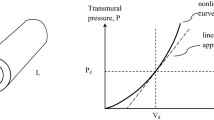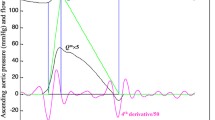Abstract
The proper understanding of the cardiovascular mechanisms involved in complaints of short-lasting dizziness and the evaluation of unexplained recurrent syncope requires continuous monitoring of cardiac stroke volume (SV) in addition to blood pressure and heart rate. The primary aim of the present study was to evaluate a pulse wave analysis method that calculates beat-to-beat flow from non-invasive arterial pressure by simulating a non-linear, time-varying model of human aortic input impedance (Modelflow; MF), by comparing MF stroke volume (SVMF) to Doppler ultrasound (US) flow velocity SV (SVUS). A second purpose was to compare the two methods under two different conditions: the supine and head-up tilt (30°) position. SVUS and SVMF with non-invasive arterial pressure (Finapres) as input to the aortic model were measured beat-to-beat during spontaneous supine breathing and in the passive 30° head-up tilt (HUT30) position in six normotensive healthy humans [three females, mean age 24 (21–26) years]. There were variations in supine SV track between the two methods with zero difference and a SD of the beat-to-beat difference (MF−US) of 4.2%. HUT30 induced a systematic difference of 10.5% and an increase in SD to 6.9%, which was reproducible. Beat-to-beat changes in SV in the supine resting condition were equally well assessed by both methods. Systematic differences appear during HUT30 and show opposite signs. The difference between the two methods upon a change in body position may be attributed to limitations in each method.




Similar content being viewed by others
References
Antonutto G, Girardis M, Tuniz D, Petri E, Capelli C (1994) Assessment of cardiac output from noninvasive determination of arterial pressure profile in subjects at rest. Eur J Appl Physiol 69:183–188
Antonutto G, Girardis M, Tuniz D, di Prampero PE (1995) Noninvasive assessment of cardiac output from arterial pressure profiles during exercise. Eur J Appl Physiol 72:18–24
Blomqvist CG, Stone HL (1984) Cardiovascular adjustments to gravitational stress. In: Shepherd JT, Abboud FM (eds) Handbook of physiology, section 2, The cardiovascular system, vol 3, Peripheral circulation and organ blood flow. American Physiological Society, Washington, D.C., pp 1025–1063
Eriksen M, Walloe L (1990) Improved method for cardiac output determination in man using ultrasound Doppler technique. Med Biol Eng Comput 28:555–560
Espersen K, Jensen EW, Rosenborg D, Thomsen JK, Eliasen K, Olsen NV, Kanstrup I-L (1995) Comparison of cardiac output measurement techniques: thermodilution, Doppler, CO2-rebreathing and the direct Fick method. Acta Anaesthesiol Scand 39:245–251
Farhi LE, Nesarajah MS, Olszowka AJ, Metildi LA, Ellis AK (1976) Cardiac output determination by simple one-step rebreathing technique. Respir Physiol 28:141–159
Friedman DB, Jensen FB, Matzen S, Secher NH (1990) Non-invasive blood pressure monitoring during head-up tilt using the Penaz principle. Acta Anaesthesiol Scand 34:519–522
Guz A, Innes JA, Murphy K (1987) Respiratory modulation of left ventricular stroke volume in man measured using pulsed Doppler ultrasound. J Physiol (Lond) 393:499–512
Hamilton WF (1948) Comparison of the Fick and dye-injection methods of measuring the cardiac output in man. Am J Physiol 153:H309–H321
Harms MPM, Wesseling KH, Pott F, Jenstrup M, Van Goudoever J, Secher NH, Van Lieshout JJ (1999) Continuous stroke volume monitoring by modelling flow from non-invasive measurement of arterial pressure in humans under orthostatic stress. Clin Sci 97:291–301
Harms MPM, Colier WNJM, Wieling W, Lenders JW, Secher NH, Van Lieshout JJ (2000) Orthostatic tolerance, cerebral oxygenation, and blood velocity in humans with sympathetic failure. Stroke 31:1608–1614
Ide K, Pott F, Van Lieshout JJ, Secher NH (1998) Middle cerebral artery blood velocity depends on cardiac output during exercise with a large muscle mass. Acta Physiol Scand 162:13–20
Innes JA, Mills CJ, Noble MI, Murphy K, Pugh S, Shore AC, Guz A (1987) Validation of beat by beat pulsed Doppler measurements of ascending aortic blood velocity in man. Cardiovasc Res 21:72–80
Jansen JRC, Wesseling KH, Settels JJ, Schreuder JJ (1990) Continuous cardiac output monitoring by pulse contour during cardiac surgery. Eur Heart J 11 [Suppl I]:26–32
Jansen JRC, Schreuder JJ, Mulier JP, Smith NT, Settels JJ, Wesseling KH (2001) A comparison of cardiac output derived from the arterial pressure wave against thermodilution in cardiac surgery patients. Br J Anaesth 87:212–222
Jellema WT, Imholz BPM, Van Goudoever J, Wesseling KH, Van Lieshout JJ (1996) Finger arterial versus intrabrachial pressure and continuous cardiac output during head-up tilt testing in healthy subjects. Clin Sci 91:193–200
Jellema WT, Wesseling KH, Groeneveld AB, Stoutenbeek CP, Thijs LG, Van Lieshout JJ (1999) Continuous cardiac output in septic shock by simulating a model of the aortic input impedance: a comparison with bolus injection thermodilution. Anesthesiology 90:1317–1328
Langewouters GJ (1982) Visco-elasticity of the human aorta in vitro in relation to pressure and age. Doctoral dissertation, Free University, Amsterdam
Langewouters GJ, Wesseling KH, Goedhard WJA (1984) The static elastic properties of 45 human thoracic and 20 abdominal aortas in vitro and the parameters of a new model. J Biomech 17:425–535
Loeppky JA, Hoekenga DE, Greene ER, Luft UC (1984) Comparison of noninvasive pulse Doppler and Fick measurements of stroke volume in cardiac patients. Am Heart J 107:339–346
McGuire DK, Levine BD, Williamson JW, Snell PG, Blomqvist CG, Saltin B, Mitchell JH (2001) A 30-year follow-up of the Dallas Bedrest and Training Study. I. Effect of age on the cardiovascular response to exercise. Circulation 104:1350–1357
Ng AV, Johnson DG, Callister R, Seals DR (1995) Muscle sympathetic nerve activity during postural change in healthy young and older adults. Clin Auton Res 5:57–60
Petersen ME, Williams TR, Sutton R (1995) A comparison of non-invasive continuous finger blood pressure measurement (Finapres) with intra-arterial pressure during prolonged head-up tilt. Eur Heart J 16:1641–1654
Pott F, Van Lieshout JJ, Ide K, Madsen P, Secher NH (2003) Middle cerebral artery blood velocity during intense static exercise is dominated by a Valsalva maneuver. J Appl Physiol 94:1335–1344
Rogers GG, van der Walt W (1997) An evaluation of exercise cardiac output using the CO2 rebreathing extrapolation technique. Eur J Appl Physiol 75:431–434
Rushmer RF (1979) Effects of posture. In: Rushmer RF (ed) Cardiovascular dynamics. Saunders, Philadelphia, pp 192–219
Stevens PM (1966) Cardiovascular dynamics during orthostasis and the influence of intravascular instrumentation. Am J Cardiol 17:211–218
Stok WJ, Stringer RC, Karemaker JM (1999) Noninvasive cardiac output measurement in orthostasis: pulse contour analysis compared with acetylene rebreathing. J Appl Physiol 87:2266–2273
Taylor JA, Halliwill JR, Brown TE, Hayano J, Eckberg DL (1995) 'Non-hypotensive' hypovolaemia reduces ascending aortic dimensions in humans. J Physiol (Lond) 483:289–298
Toska K, Eriksen M (1993) Respiration-synchronous fluctuations in stroke volume, heart rate and arterial pressure in humans. J Physiol (Lond) 472:501–512
Toska K, Eriksen M (1994) Peripheral vasoconstriction shortly after onset of moderate exercise in humans. J Appl Physiol 77:1519–1525
Toska K, Walloe L (2002) Dynamic time course of hemodynamic responses after passive head-up tilt and tilt back to supine position. J Appl Physiol 92:1671–1676
Toska K, Eriksen M, Walloe L (1994) Short-term cardiovascular responses to a step decrease in peripheral conductance in humans. Am J Physiol 266:H199–H211
Van Lieshout JJ, Wieling W, Karemaker JM, Secher NH (2003) Syncope, cerebral perfusion, and oxygenation. J Appl Physiol 94:833–848
Wesseling KH, Jansen JRC, Settels JJ, Schreuder JJ (1993) Computation of aortic flow from pressure in humans using a nonlinear, three-element model. J Appl Physiol 74:2566–2573
Westerhof N, Elzinga G, Sipkema P (1971) An artificial arterial system for pumping hearts. J Appl Physiol 31:776–781
Acknowledgement
Supported by the Netherlands Heart Foundation (Grant 99.182).
Author information
Authors and Affiliations
Corresponding author
Rights and permissions
About this article
Cite this article
van Lieshout, J.J., Toska, K., van Lieshout, E.J. et al. Beat-to-beat noninvasive stroke volume from arterial pressure and Doppler ultrasound. Eur J Appl Physiol 90, 131–137 (2003). https://doi.org/10.1007/s00421-003-0901-8
Accepted:
Published:
Issue Date:
DOI: https://doi.org/10.1007/s00421-003-0901-8




